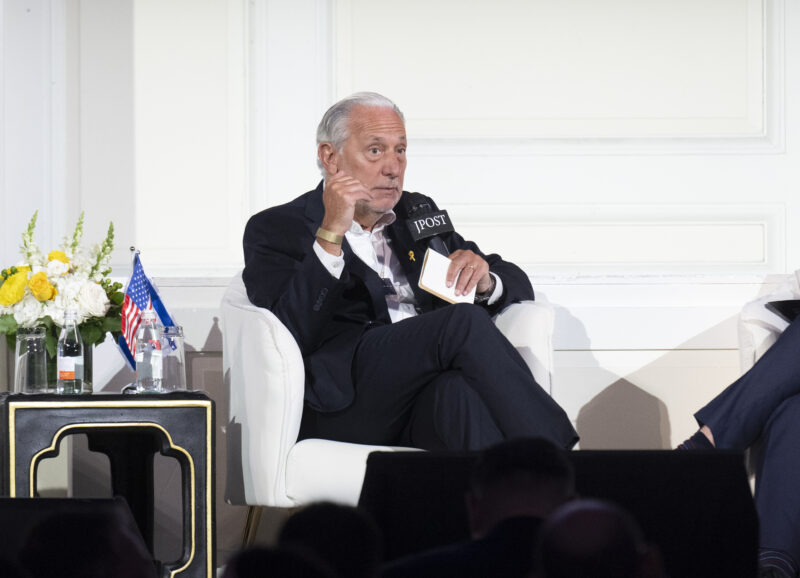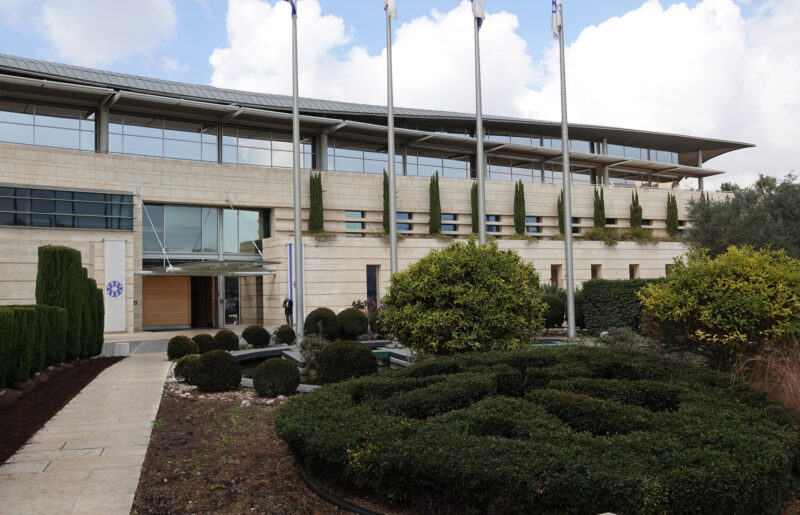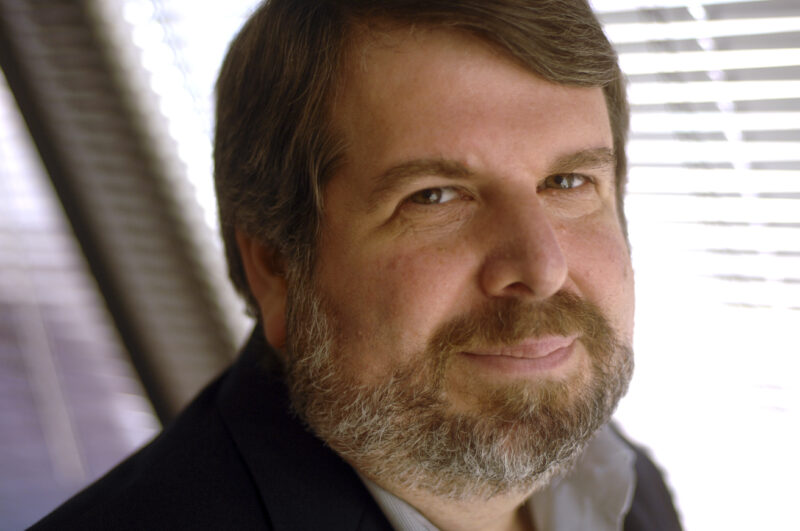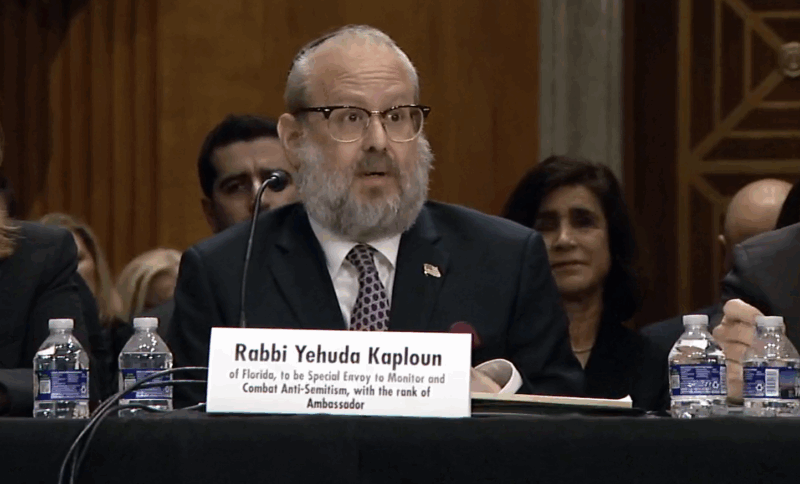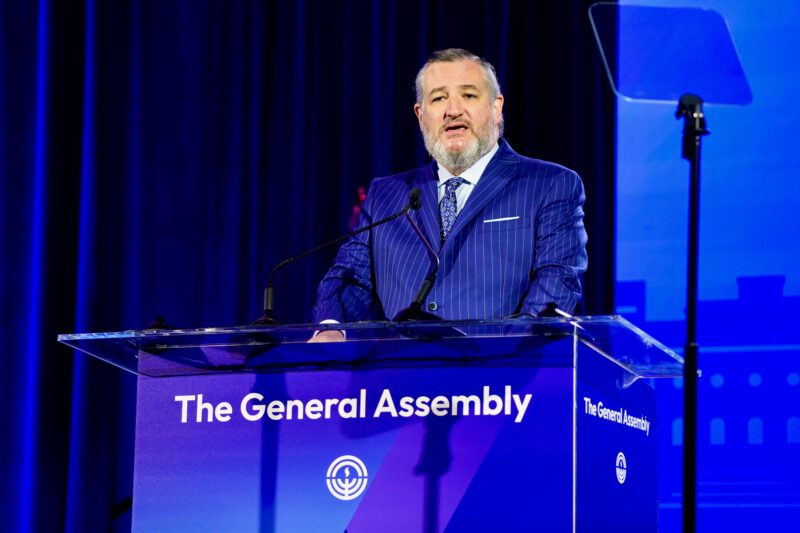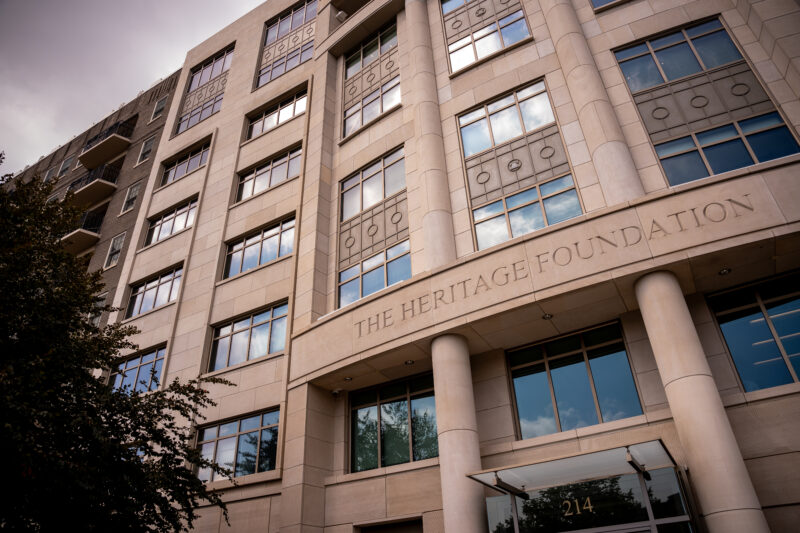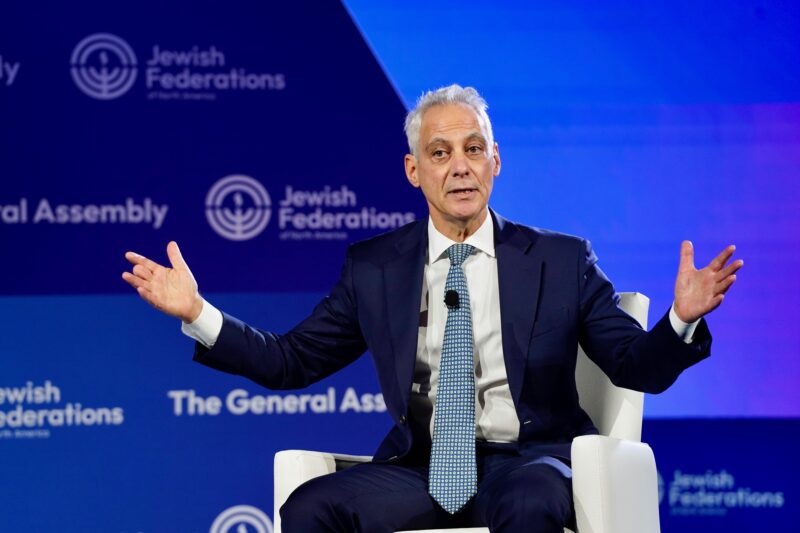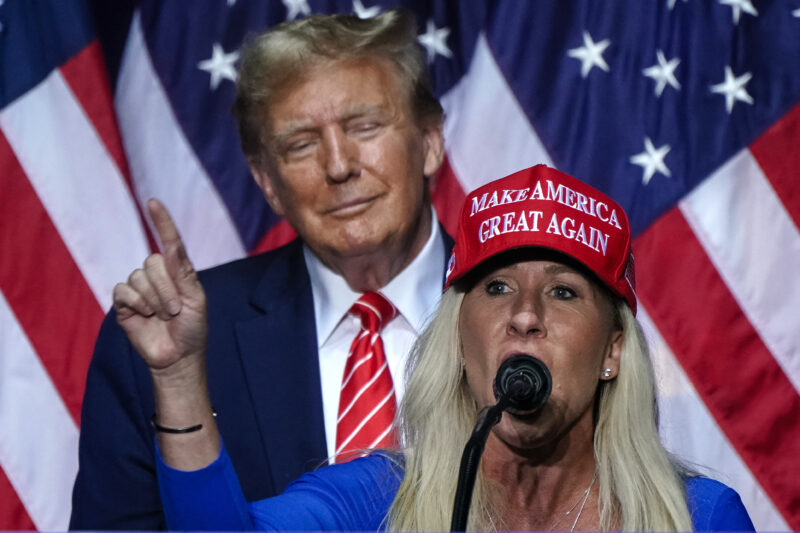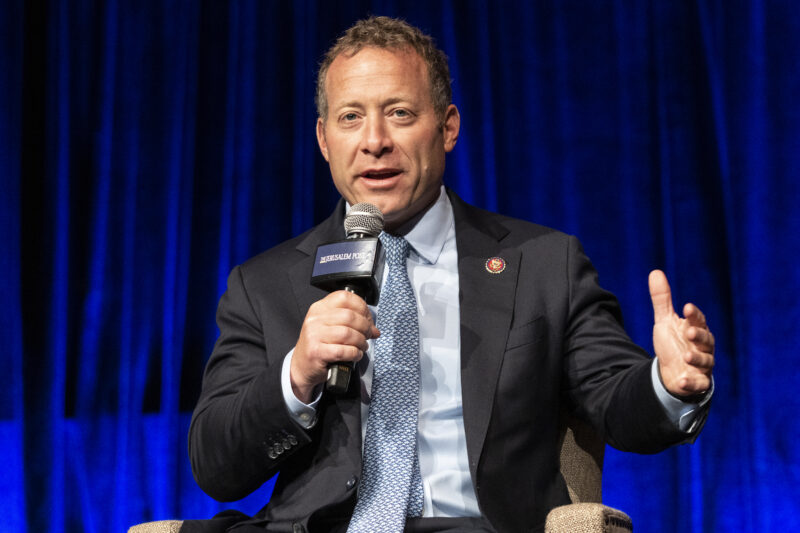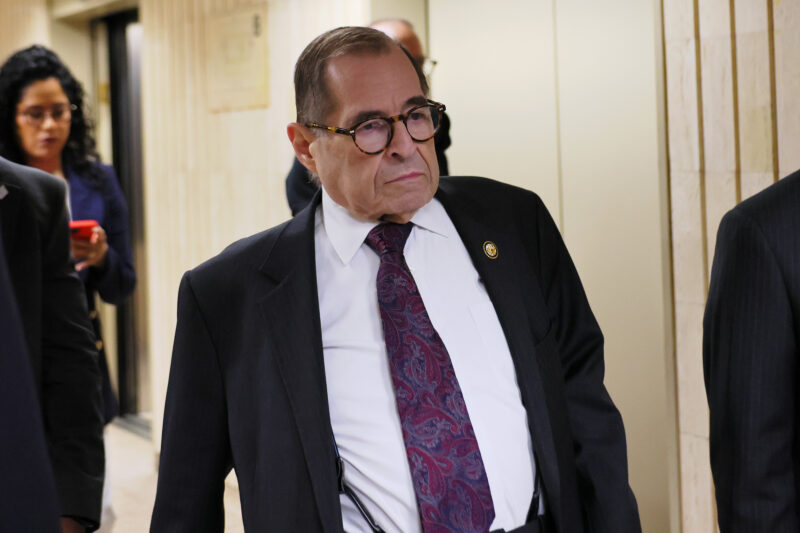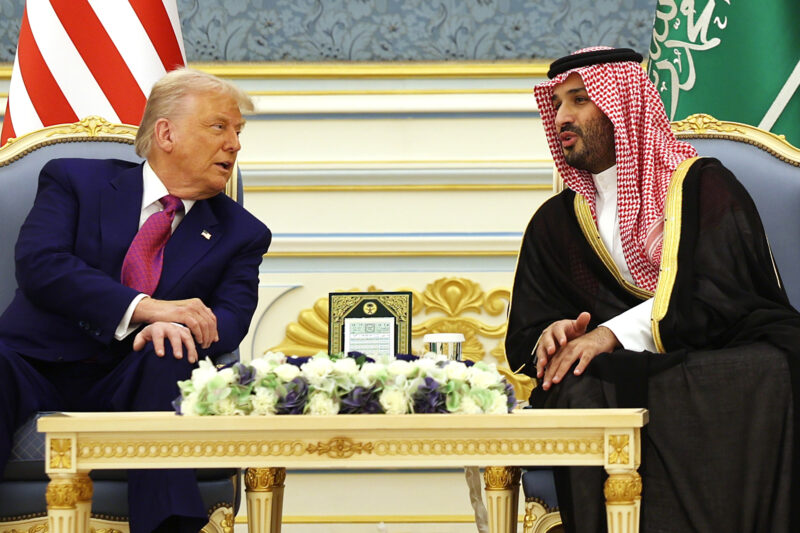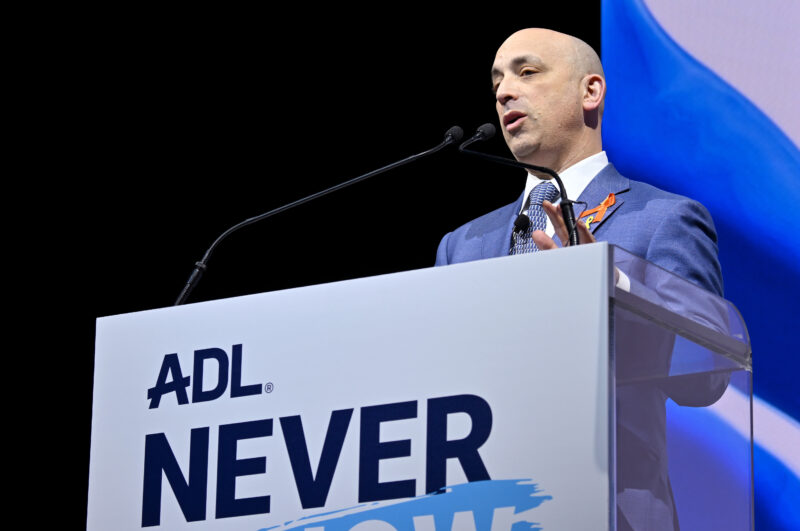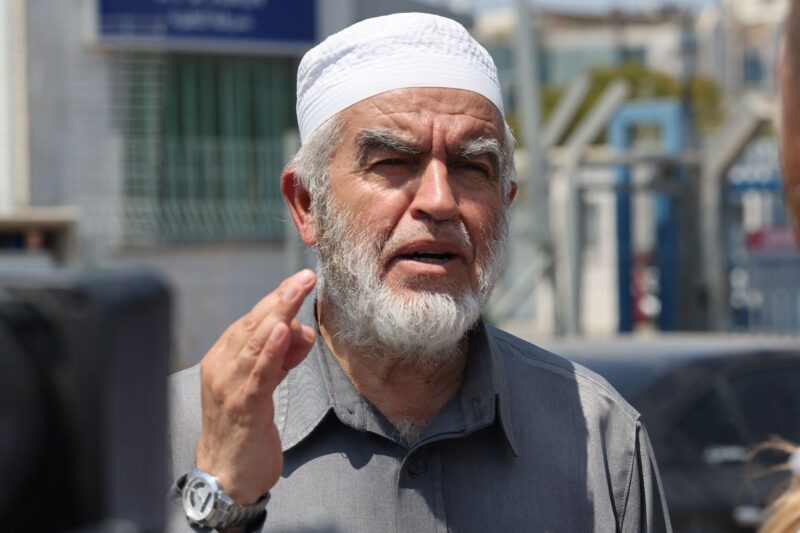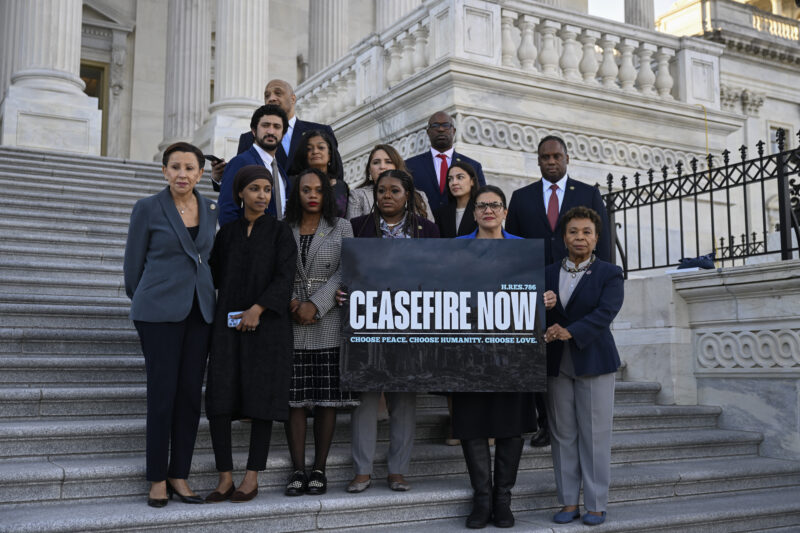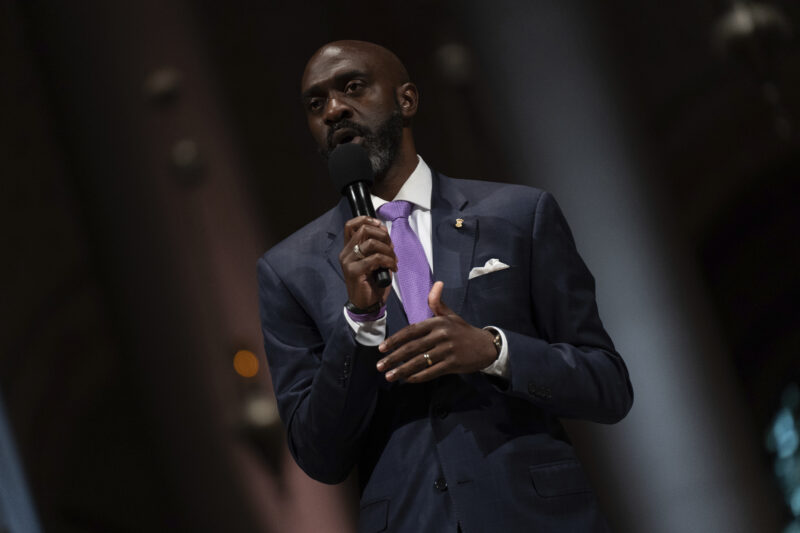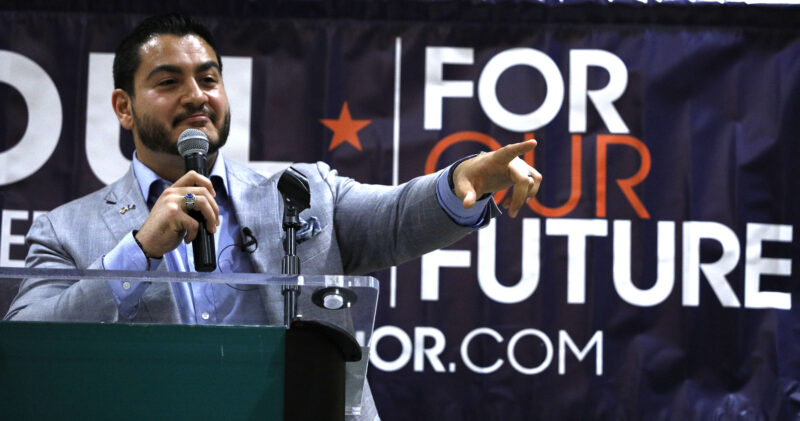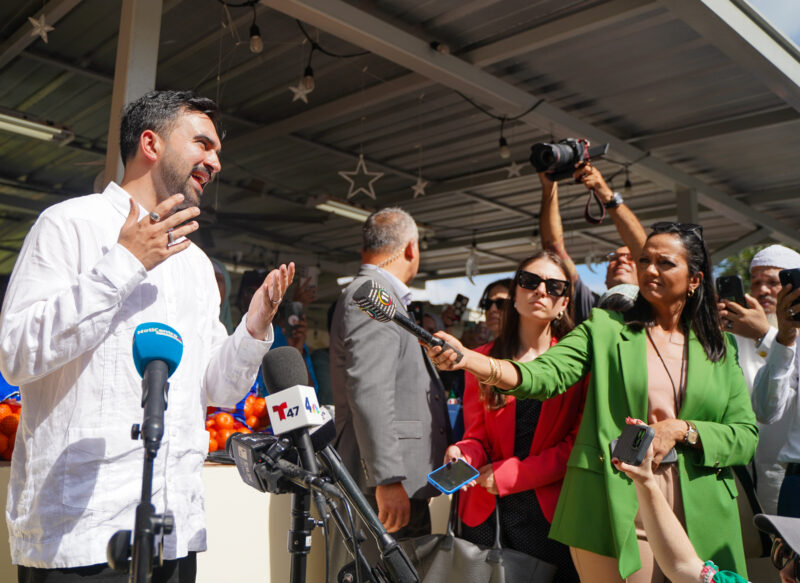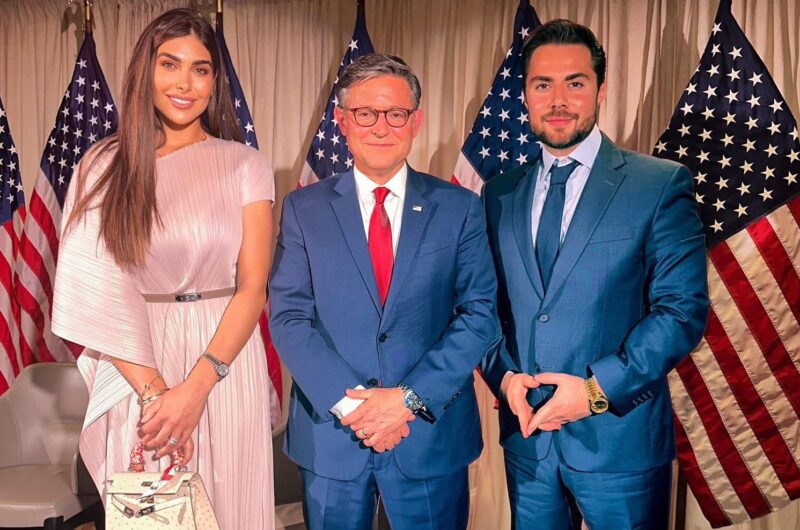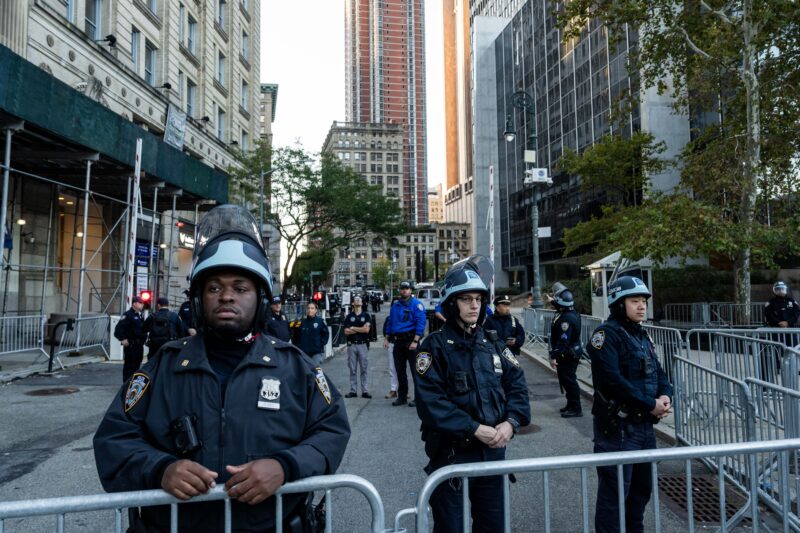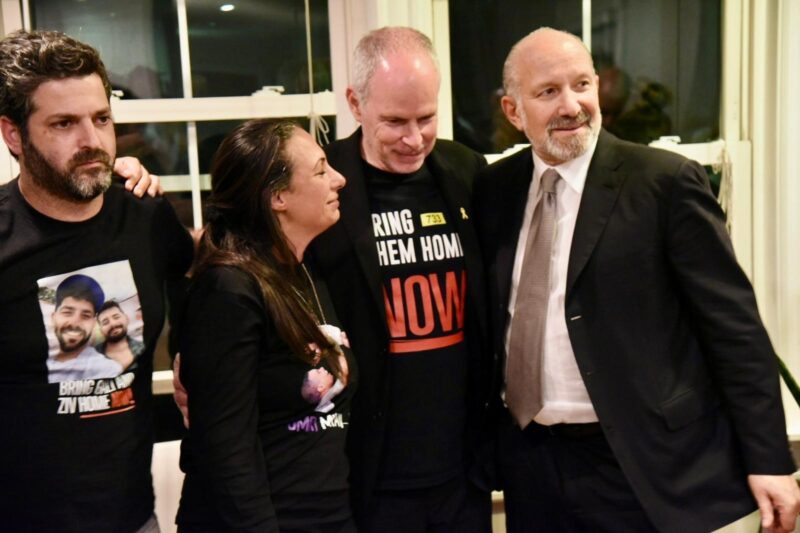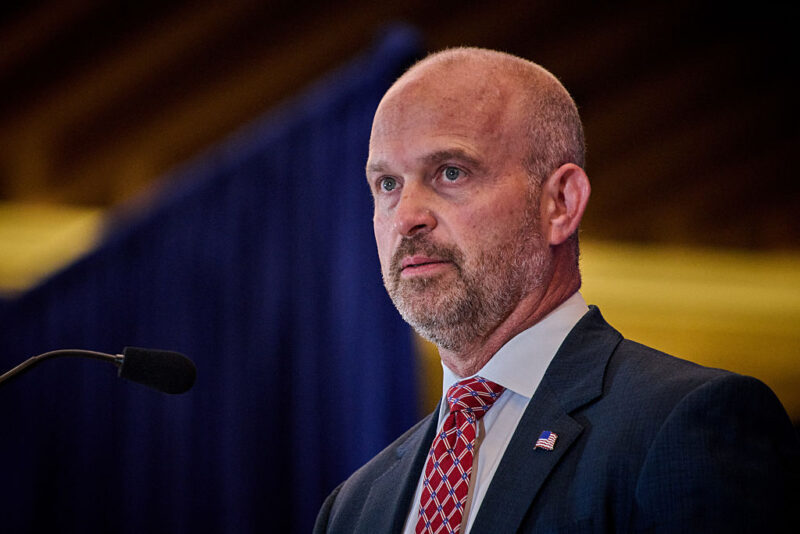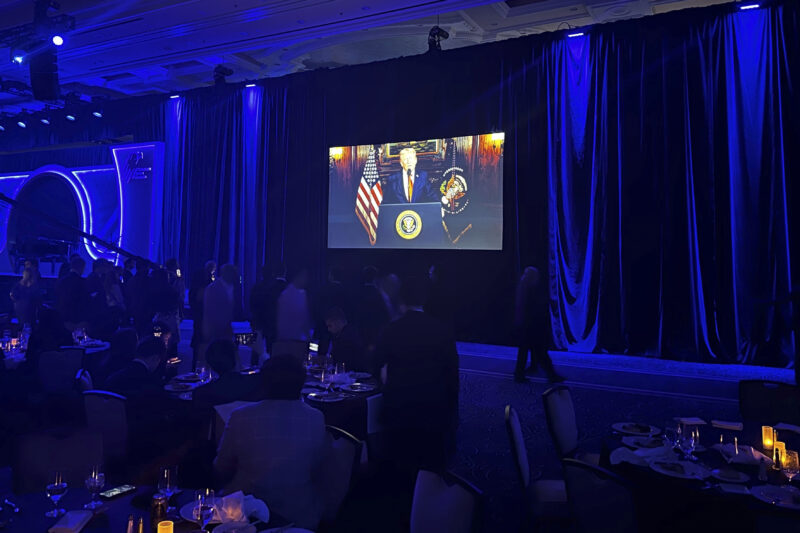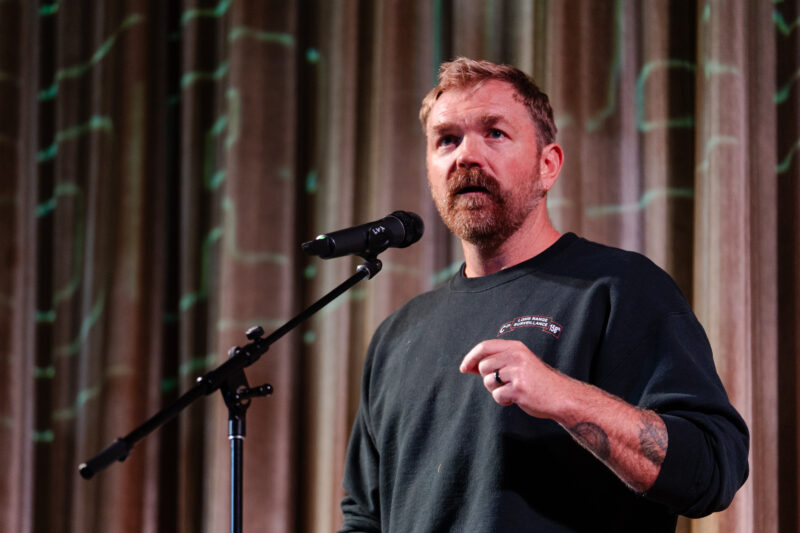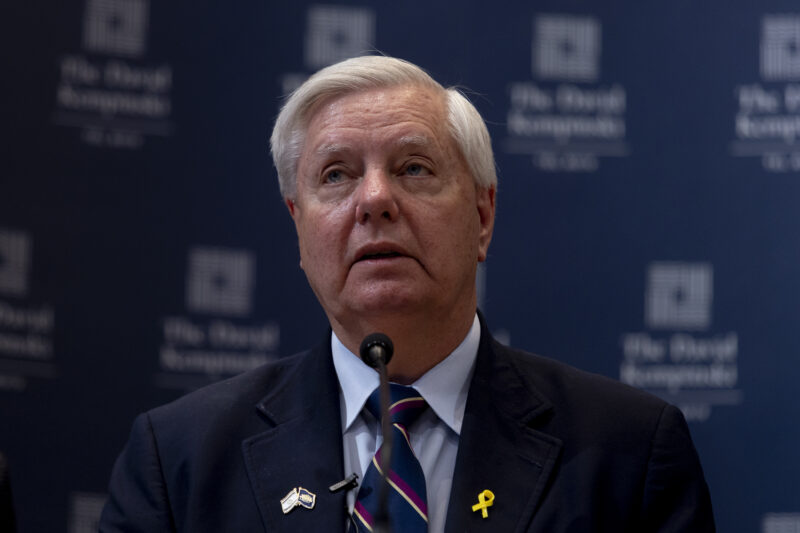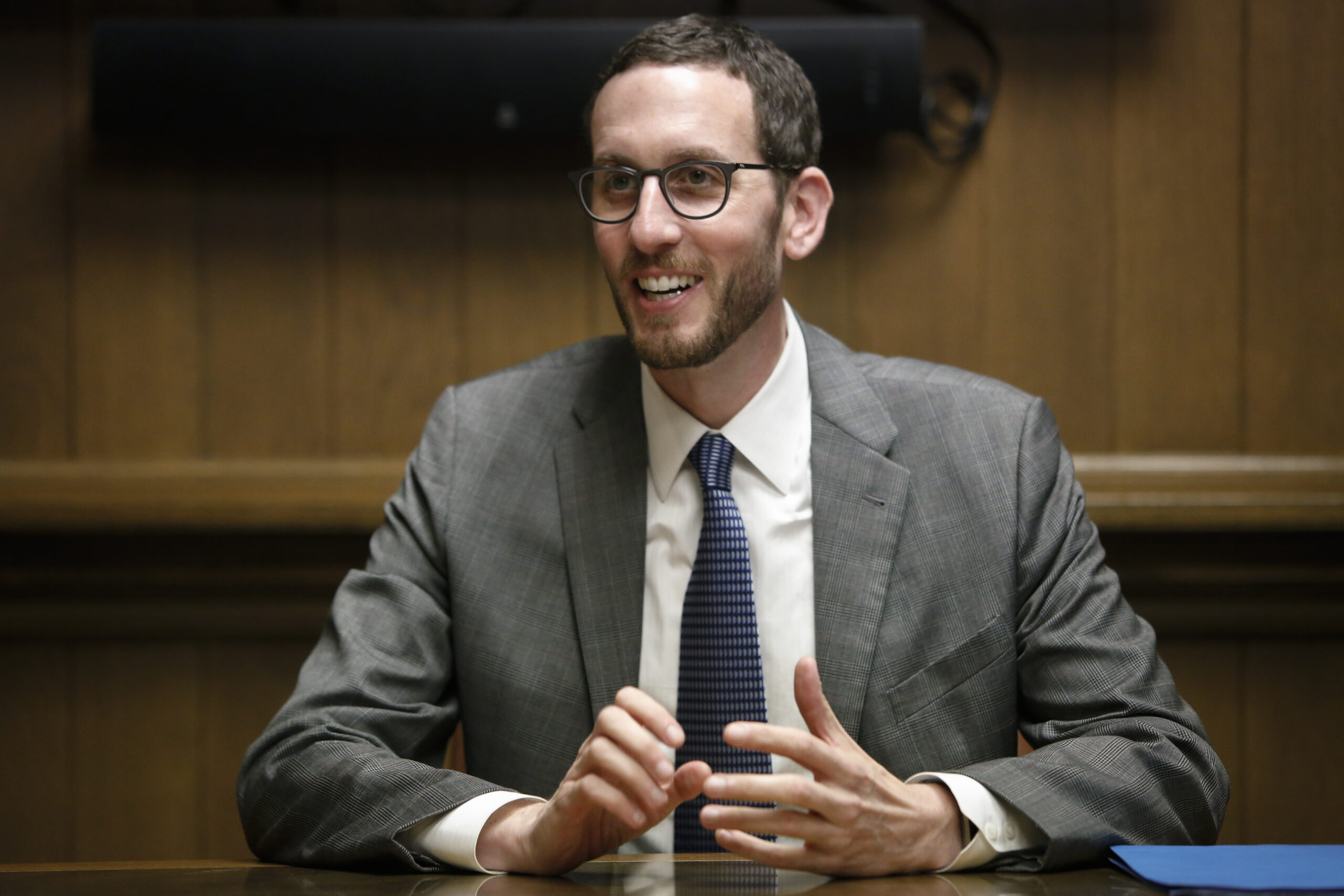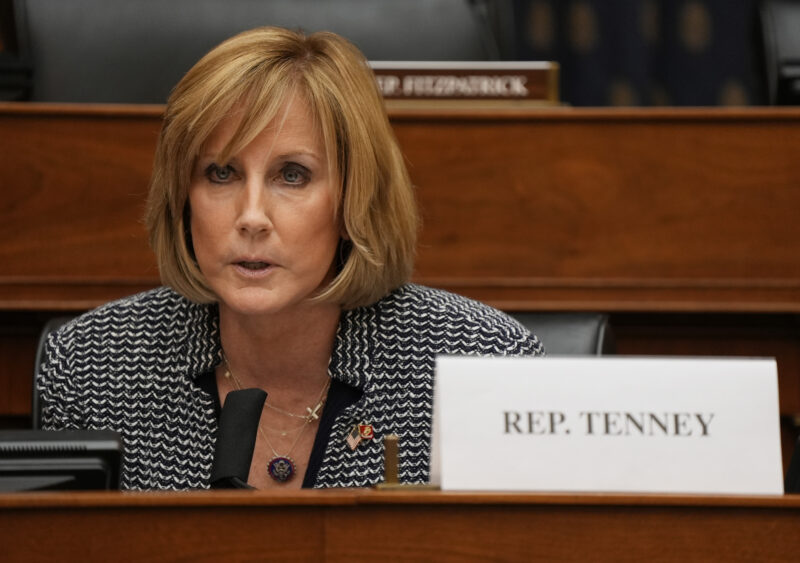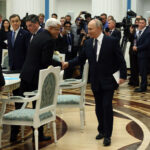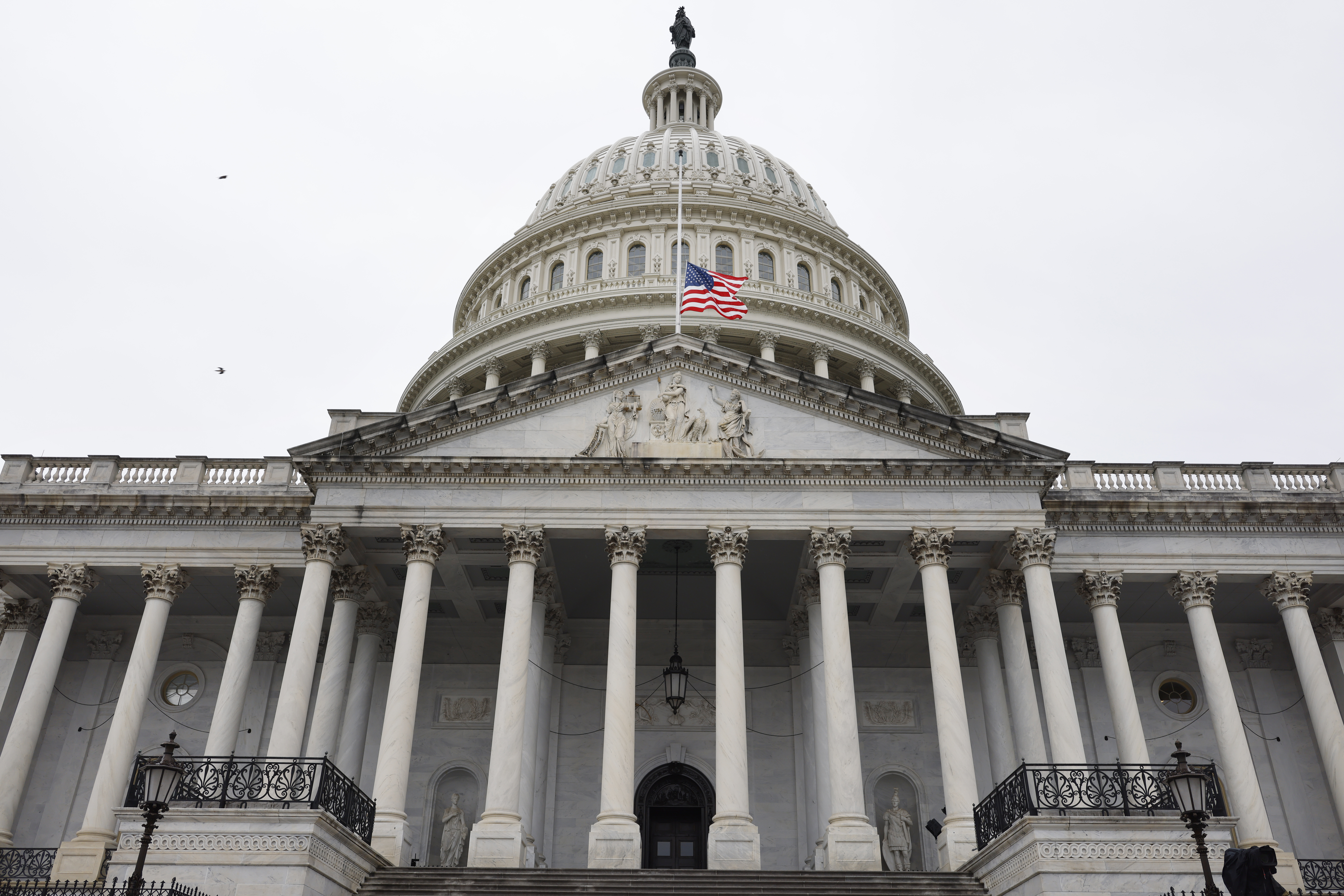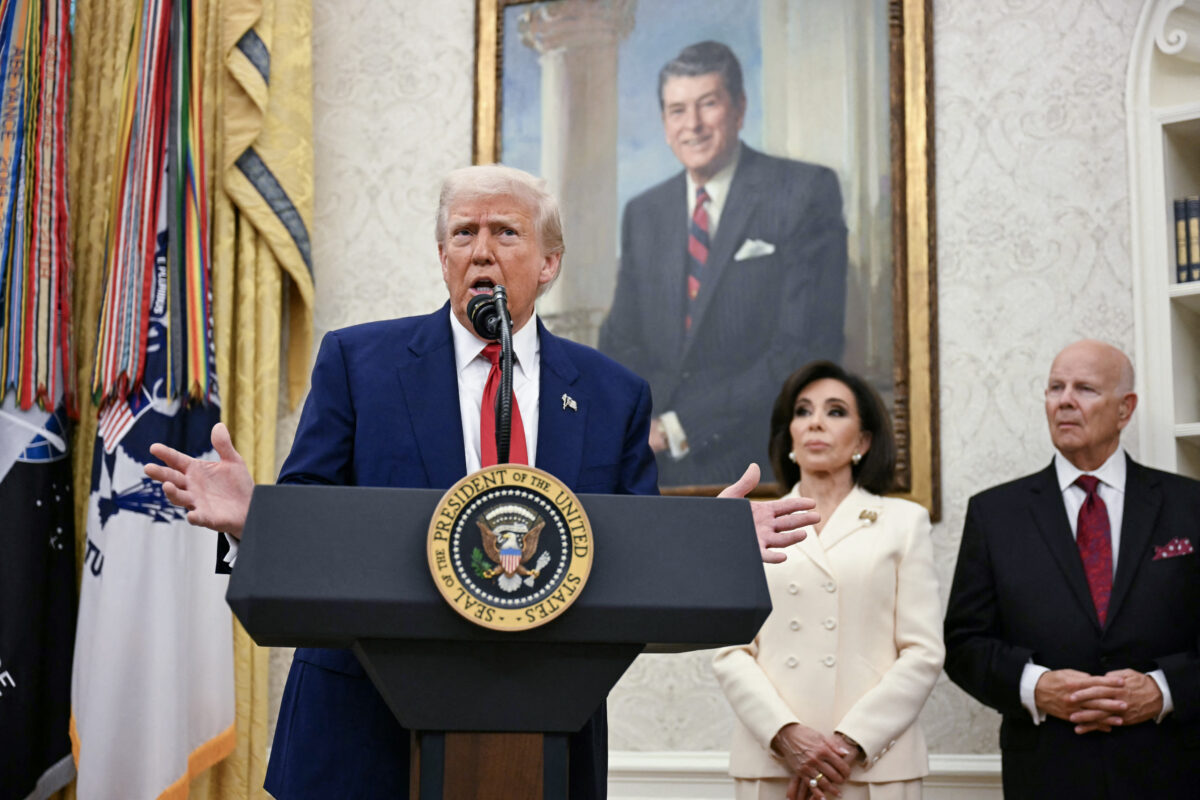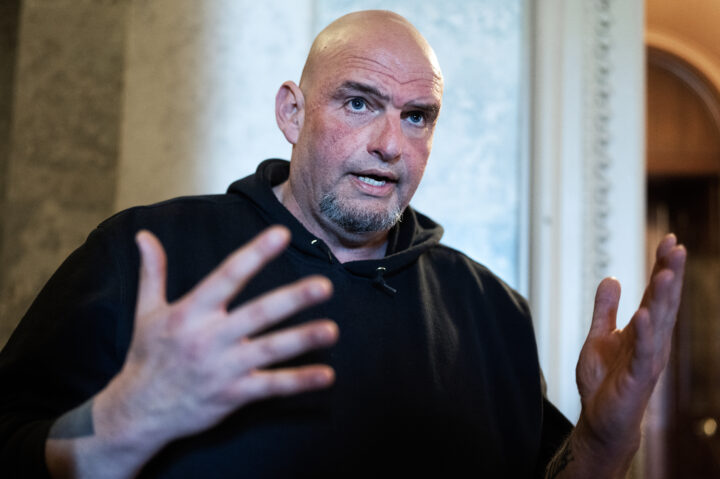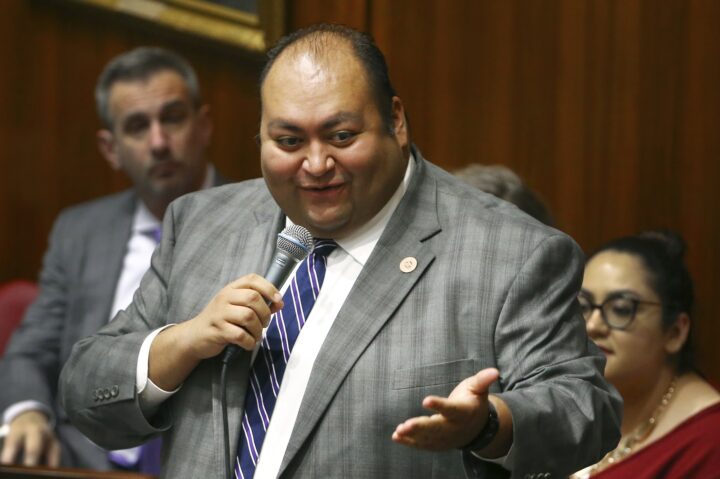Former DNC vice chair Michael Blake’s launch video included Guy Christensen, who justified the murder of two Israeli Embassy staffers at the Capital Jewish Museum
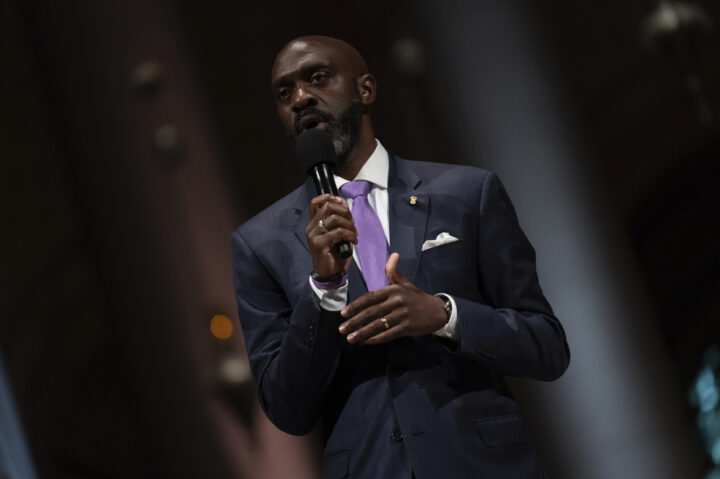
Derek French / SOPA Images/Sipa USA)(Sipa via AP Images
Democratic mayoral candidate Michael Blake speaks during the 'Mayoral Candidate Forum All Faiths, All Candidates' event at Cathedral of St. John the Divine.
Major New York Jewish groups criticized former Assemblyman Michael Blake, who is running in the Democratic primary against Rep. Ritchie Torres (D-NY), for featuring a clip of an influencer who supported the shooting of two Israeli Embassy employees at the Capital Jewish Museum in Washington in his campaign launch video.
Blake’s video features a short clip from a social media video posted by Guy Christensen, an anti-Israel activist, accusing Torres of “investing in genocide,” one of the first clips in the video.
Christensen praised the alleged D.C. shooter, Elias Rodriguez, urging his followers to support Rodriguez and describing his “act of resistance” as “justified” and to respond with “greater resistance and escalation” in the face of a potential crackdown against the anti-Israel movement.
“I do not condemn the elimination of those two Zionist officials,” Christensen said on social media at the time of the shooting. “[Rodriguez] is not a terrorist. He’s a resistance fighter. And the fact is that the fight against Israel’s war machine, against their genocide machine, against their criminality, includes their foreign diplomats in this country and internationally.”
Christensen was expelled from The Ohio State University for the video, which was taken down by TikTok.
In a statement, the Jewish Community Relations Council of New York condemned Blake’s video, both for featuring Christensen and for its use of other antisemitic tropes.
“Hurling a bus load of antisemitic tropes and platforming bigots who cheer antisemitic violence in a launch video is not the pro-humanity flex one thinks it is. In the backdrop of rising hate, this only deepens division, further inflames an already inflammatory climate in New York, and makes us all less safe,” the group said in a statement.
The Anti-Defamation League of New York and New Jersey focused its criticism specifically on the Christensen clip.
“No matter what your views are on the candidates or the issues, we can all agree that Michael Blake’s platforming of anti-Zionist influencer Guy Christensen should be roundly condemned,” the group said. “Christensen is an activist who regularly touts Hamas and promotes antisemitic ideas, and he defended the shooter that left two dead at the Jewish Museum this past spring.”
UJA-Federation of New York said in a statement, “We strongly condemn any use of antisemitic vitriol and those who promote it to attack opponents.”
“Regardless of beliefs, actively platforming Guy Christensen, who regularly shares antisemitic ideas and pro-Hamas rhetoric — in addition to defending the heinous antisemitic shooting in Washington, DC, this spring — is absolutely unacceptable,” UJA continued.
Blake apologized in a statement, issued late Monday after a group of local rabbis also joined the chorus of criticism.
“I unequivocally denounce the murder and celebration of the two young Israeli embassy staffers, as stated in my May 22nd, 2025 post on X, and I apologize for any pain our campaign video caused any member of the Jewish community by including someone who condoned this horrific event,” Blake said. “Just as I would for anyone targeted for the color of their skin, faith, or identity, I stand firmly against all acts of hate and violence. I am focused on the Cost of Living and Affordability crisis impacting all of the district, where Ritchie Torres’ actions have failed, along with continuing to address Antisemitism, Anti-Muslim hate, Housing and Immigration. We deserve better than Ritchie Torres.”
Michael Blake frequently attended AIPAC events between 2014-2019, and was a featured speaker at their 2017 policy conference

Derek French / SOPA Images/Sipa USA)(Sipa via AP Images
Democratic mayoral candidate Michael Blake speaks during the 'Mayoral Candidate Forum All Faiths, All Candidates' event at Cathedral of St. John the Divine.
Michael Blake, a former New York state assemblyman and eighth-place-finishing New York City mayoral candidate, announced a primary challenge to Rep. Ritchie Torres (D-NY) on Wednesday focused squarely on Torres’ support for Israel and ties to AIPAC.
But Blake himself has an extensive history with AIPAC and was, at least through 2020, a vocal supporter of the Jewish state.
In his campaign announcement on X, Blake said, “I am ready to fight for you and lower your cost of living while Ritchie fights for a Genocide. I will focus on Affordable Housing and Books as Ritchie will only focus on AIPAC and Bibi,” a reference to Israeli Prime Minister Benjamin Netanyahu. “I will invest in the community. Ritchie invests in Bombs.”
Blake attached a video that focuses heavily on attacking Torres’ support for Israel and the backing he has received from AIPAC, with clips accusing Torres of being “bought” by supporters of Israel and of focusing more on Israel than his own district. At one point, the video shows Torres with dollar signs over his eyes.
“In 2025, Ritchie has nearly $15 million on hand, largely from AIPAC, while many of his constituents barely have $15 to get by,” Blake states in the video. “Ritchie Torres cares more about Bibi than he cares about the Bronx. More about AIPAC than he does about your academics.”
Social media posts by Blake and others show that he was for years a frequent attendee at AIPAC events, having attended no less than 10 of the organization’s events between 2014 and 2019, and was a featured speaker at least once.
“From entrepreneurship, to political organizing, to deepening my faith as a Christian, AIPAC and AIEF [AIPAC-affiliated American Israel Education Foundation] changed my life forever,” Blake said as a speaker at AIPAC’s 2017 policy conference. “Traveling to Israel made me a better legislator, better activist, and helped me to understand that as a leader within my community and the Democratic Party, I have a responsibility to support America’s friend and ally, Israel.”
Blake traveled to Israel with AIEF and with the New York Jewish Community Relations Council.
As recently as 2020, as a Democratic National Committee vice chair, Blake insisted that the Democratic Party would continue to support Israel, saying of the party platform, “We have been attentive to the previous conversations that have happened in terms of making sure there’s not language in there that would be anti-Israel.”
In a 2020 interview with Jewish Insider, Blake — who posted a photo of Netanyahu speaking at a 2014 AIPAC event — declined to endorse Sen. Bernie Sanders’ (I-VT) characterization of Netanyahu as a “reactionary racist.” And he drew parallels between his experience as a Black man in the Bronx and the experience of Israeli Jews facing terrorism.
Blake also met on various occasions with Israeli officials and diplomats and attended the 2018 Israel Day Parade in Manhattan.
The former state lawmaker made a sharp turn on Israel following the Oct. 7, 2023, Hamas attacks on Israel and the ensuing war in Gaza, accusing Israel of “genocide” weeks after Oct. 7 and calling for a ceasefire while making no mention of the Israeli hostages held by Hamas.
He also opposed congressional legislation aimed at combating antisemitism and the censure of Rep. Rashida Tlaib (D-MI) for antisemitic and anti-Israel comments, and backed former Rep. Jamaal Bowman (D-NY), who denied Hamas atrocities on Oct. 7.
A pro-Israel activist who requested anonymity in order to speak candidly told JI, “The pro-Israel community is surprised by his 180-degree reversal. Blake spoke at pro-Israel events and received considerable financial support from the community. Once he proclaimed to be a pro-Israel stalwart and now he has joined the ranks of the detractors.”
Blake’s campaign did not respond to questions from JI but he faced criticism and questions on X over his past AIPAC ties. In response, he claimed that he walked away from the group “before the Genocide” and after “seeing how they treated Black leaders including Pres. Obama.”
But Blake’s appearance at an AIPAC conference, and other contacts with the group, continued well after Obama’s time in office and the former president’s public clashes with the group over issues like the Iran nuclear deal.
Blake also downplayed his speech at the 2017 policy conference as having happened eight years ago, even as he continued to attend AIPAC events for years afterward.
Torres: ‘War becomes a process of mutual dehumanization which we’re seeing in real time’

Michael M. Santiago/Getty Images
Rep. Ritchie Torres (D-NY) speaks at a press conference endorsing New York City Mayoral candidate Andrew Yang on January 14, 2021 in New York City.
Rep. Ritchie Torres (D-NY) on Tuesday warned that the war in Gaza appears to be turning into a “quagmire” akin to the Iraq war, without clear objectives or any realistic end point.
The pro-Israel Democrat has grown more vocal lately about his criticisms of the Israeli government and how it has been handling the war in Gaza, as concern about the humanitarian situation in the enclave has mounted on both sides of the aisle. He has also continued to offer support for Israel and emphasize that Hamas is primarily responsible for the war in Gaza.
“I want to see Israel secure the release of hostages and end the war, because as long as the war persists, there’s a real potential — our experience with Afghanistan and Iraq tells us that wars in the Middle East can morph into quagmires that have no clear end in sight that have no clearly defined strategic objectives,” Torres said in an interview with The Bulwark.
“I feel this is a quagmire that could persist indefinitely with no clear end in sight,” he continued, a situation he said would limit the Israeli economy and expansion of the Abraham Accords. He said the Israeli government has failed to outline clear objectives for the war. “It feels like a quagmire reminiscent of the war in Iraq.”
He said that Israel has been “extraordinarily effective” in its operations against Hezbollah and Iran, “but [I] have concerns about the war in Gaza.”
Torres said that “war becomes a process of mutual dehumanization which we’re seeing in real time. There should be space in the American heart for the humanity of both Israelis and Palestinians.”
He said that Hamas is the “central cause” and “primarily responsible for the suffering that has been unleashed since Oct. 7.”
But he also said that the “humanitarian crisis in Gaza is simply and morally unacceptable and all parties including Israel and the United States must do their part to ease the hardship and hunger that has taken hold in the Gaza strip. To me, it is wrong to deny or downplay the crisis.”
He rejected arguments that he said he’d seen from Israeli officials that the crisis in Gaza is purely Hamas propaganda, and said that he can’t deny to constituents concerned about the issue that it is happening.
The correct response, he continued, is “not to downplay it, but it’s to tell our constituents that we are doing everything that we can to ease suffering among Palestinian civilians and children. That the war is not against the Palestinian people. It’s against Hamas.”
Torres: ‘The accusations against Israel, whether it’s genocide, apartheid or [deliberate] starvation, are all false. It’s all a propaganda campaign’

Israel on Campus Coalition on X
Rep. Ritchie Torres (D-NY) speaks at the ICC National Leadership Summit in Washington on July 29, 2025.
In comments to a supportive crowd of pro-Israel college students in Washington, Rep. Ritchie Torres (D-NY) said Tuesday that the world needs to be reminded that “Hamas is the central cause of the war in Gaza.”
“We have to remind the world that despite the amnesia, Hamas is the central cause of [Israel’s] war in Gaza. The primary responsibility for a war lies with its cause … Hamas is morally responsible, principally responsible for the war in Gaza,” Torres, a pro-Israel Democratic stalwart in Congress, told about 700 attendees gathered in Washington for the Israel on Campus Coalition’s three-day annual national leadership summit.
Torres went on: “The accusations against Israel, whether it’s genocide, apartheid or [deliberate] starvation, are all false. It’s all a propaganda campaign. But we also have to recognize there is a humanitarian crisis in Gaza … We should be doing everything we can to alleviate the human suffering in Gaza.”
At the same time, Torres offered criticism of the Israeli government’s public diplomacy, saying that it should be “mindful of the words” it speaks.
“Israel is the first country in history to be conducting a war under the scrutiny of 24/7 cable news and social media … so given those realities, you have to be more effective, not only in the actual war but the informational war and be mindful of the words you speak.”
“There are moments when I feel like the Israeli government has the worst PR operation I’ve ever seen,” Torres said. “We are morally better than the other side. We have the moral high ground, we should act like it.”
Asked about the ideological direction of the Democratic Party, which has become increasingly critical of Israel, Torres sidestepped the question. “Look, I reject isolationism whether it’s coming from the far left or the far right. In the end, isolationism is no friend of the United States and it’s no friend of the U.S.-Israel relationship,” Torres said.
The vocal pro-Israel Democrat said he has ‘no real relationship’ with the Israeli government

Al Drago-Pool/Getty Images
Rep. Ritchie Torres, a Democrat from New York, speaks at a House Financial Services Committee hearing on oversight of the Treasury Department and Federal Reserve coronavirus pandemic response on Capitol Hillon September 30, 2021 in Washington, DC.
Rep. Ritchie Torres (D-NY), a vocal Democratic supporter of Israel in Congress, said in an interview with journalist Chuck Todd on Sunday that Israeli Prime Minister Benjamin Netanyahu had done “irreparable damage” to Israel’s relationship with and support among Democrats, tracing the origin of the breach to Netanyahu’s public clashes with President Barack Obama.
“If you’re a Democrat, and if you’re a Democrat of color and if you’re a Black Democrat, you take immense pride in Barack Obama. He represents one of the greatest achievements in politics. We take great pride in his presidency,” Torres said. “To see a foreign leader visibly disrespect him in the manner that Bibi Netanyahu did, I feel did irreparable damage to the relationship with the Democratic Party.”
Asked by Todd how he would advise the Israeli government to repair its relationship with the party, Torres offered no suggestions, repeating that “it feels like the damage may be irreparable.” He added that support for the U.S.-Israel relationship is “eroding, and anyone who denies it is ignoring the numbers.”
(Torres subsequently told Jewish Insider that the “irreparable damage” was referring to “the relationship between Netanyahu and the Democratic Party, not the relationship between Israel and the Democratic Party.”)
Torres also said that he has “no real relationship” with the Israeli government, despite his support for the Jewish state, and said that his conversations are usually general and high-level, and do not yield “useful information.”
“I do not consider myself having a good relationship with the Israeli government,” Torres said.
He said Netanyahu should have been able to disagree with Obama, “but when you inject yourself into partisan politics and put your thumb on the scale in favor of one political party, that sets a dangerous precedent, and I believe that the consequences of geopolitical calculation continue to reverberate to this day.”
Netanyahu and Obama split publicly over the U.S.’s nuclear deal with Iran, and Netanyahu accepted an invitation from then-Speaker of the House John Boehner, a Republican, to address Congress to condemn the deal.
He said that the U.S.-Israel relationship requires bipartisanship and that “if you politicize it, you’re not a friend of the relationship, you’re an enemy.”
Torres said Netanyahu had “made a terrible mistake” and that there is a “legitimate perception that the present Israeli government is just aligned with the Republican Party.”
The Democratic congressman also called for an end to the war in Gaza, the release of hostages, increased humanitarian aid to Palestinians, new Palestinian governance in Gaza and efforts to build on the Abraham Accords, arguing that warnings from Israeli reporters about the deteriorating humanitarian situation in Gaza must be heeded.
He’s one of several pro-Israel Democrats who have grown more critical of the Israeli government’s handling of the humanitarian situation in Gaza in recent days. Additionally, some congressional Republicans have warned that Israel’s conduct is risking American support.
Torres argued that the impact of the war for Israel has been mixed — even as it has severely degraded Iran and its proxies and “emerged from Oct. 7 stronger and … reestablished deterrence,” it has lost significant support in the United States.
The New York congressman has also recently raised eyebrows with his defenses of Democratic New York City mayoral candidate Zohran Mamdani — though Torres has not endorsed Mamdani and said that Mamdani must address “real concerns” in the Jewish community.
The group’s annual conference, being held in August, features a panel that describes the Oct. 7 Hamas terrorism as attacks on ‘military targets’
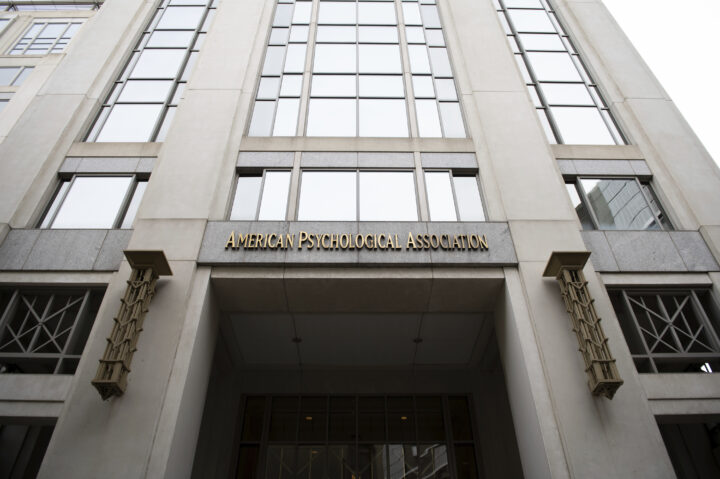
Graeme Sloan/Sipa via AP Images
A general view of the American Psychological Association headquarters in Washington, D.C. on April 23, 2020.
In late February, Dr. Julie Ancis drafted an open letter with a group called Psychologists Against Antisemitism, condemning antisemitism within the American Psychological Association. More than 3,500 people signed on to demand the organization act against what they described as “the serious and systemic problem of antisemitism/anti-Jewish hate” within the APA. With 172,000 members, it is the largest body dedicated to the study of psychology in the world.
For months, the organization appeared to do nothing. Ancis did not even get an acknowledgement that the letter had been received. But then in May, after she and another Jewish colleague raised their concerns in a meeting with Rep. Ritchie Torres (D-NY), Ancis received an invitation from senior APA officials to discuss antisemitism.
The meeting was ostensibly meant as an olive branch from the organization where she had once been a prominent member: In 2010, a division of the APA named Ancis, a distinguished professor at New Jersey Institute of Technology and one of the pioneers of the psychology field’s approach to diversity, equity and inclusion, its Woman of the Year.
Yet when Ancis looked at the list of stakeholders invited to the Zoom meeting, she was astonished to see the names of several APA groups that she considered the biggest perpetrators of antisemitism within the APA. Later, she learned that the list of invited “stakeholders” included Dr. Lara Sheehi, the president of an APA division focused on the study of psychoanalysis, who was called out in the open letter for describing Zionists as “genocidal f**ks.” (Sheehi, who left a teaching position at The George Washington University in 2024 after being accused of antisemitic conduct by some of her students, recently appeared on a podcast to defend the tactics of the man accused of shooting and killing two Israeli Embassy staffers outside the Capital Jewish Museum in Washington in May. She did not respond to a request for comment.)
“The stakeholders should include people who have expertise, not the ones who are promoting antisemitism, where we’re tokenized. It’s an absolute lose-lose situation, and hostile,” Ancis said last week. She decided not to attend. “I’m not going to sit in that farce of a meeting.”
That the APA would host a meeting about addressing antisemitism where the “stakeholders” included both Jews who have scrupulously documented harassment and bias within the organization’s ranks for months, as well as some of the people they identified as the perpetrators of that harassment, is, according to Jewish psychologists, evidence of how this historic organization has lost its way and ceded its moral voice.
“Could you imagine APA having a listening session for LGBTQ+ individuals, which includes people who are known to be homophobic?” asked Dr. David Rosmarin, director of the Spirituality and Mental Health Program at McLean Hospital in Massachusetts and a Harvard Medical School professor. “They want everyone to be included, and all that kind of stuff. What that means is that there’s no room for Jews, because they’re including people who are engaged in antisemitic, anti-Zionist rhetoric, publicly, in the discussions.”
“They’re between a rock and a hard place. They’re trying to appease different constituents, and I feel like they’re appeasing the ones who are loudest and bigger, and that’s not the Jewish professionals,” Dr. Julie Ancis told JI.
Several leading Jewish psychologists told Jewish Insider in interviews last week that the APA has repeatedly failed to respond to the concerns of its Jewish members, despite a stated commitment to promoting an “accessible, equitable and inclusive psychology that promotes human rights, fairness and dignity for all,” according to the organization’s diversity mission. They say the APA has avoided taking a stand against double standards and litmus tests applied to Jewish psychologists who are vilified for their support for Israel.
Instead, the organization has been almost paralyzed in the aftermath of the Oct. 7, 2023, Hamas terror attacks and ensuing war, seemingly afraid to take sides between the Jewish psychologists seeking support and an increasingly vocal contingent of anti-Israel voices in the field, some of whom have described Zionism as a pathology to root out.
“They’re between a rock and a hard place. They’re trying to appease different constituents, and I feel like they’re appeasing the ones who are loudest and bigger, and that’s not the Jewish professionals,” Ancis told JI.
The APA is the key body shaping the education of psychologists in the United States. It accredits masters- and doctorate-level academic programs at hundreds of universities across the country. So while the battle over antisemitism in this organization may seem like an internecine ivory tower fight, the way it is handled is poised to have major implications for the future of psychology — a field that touches the millions of Americans who see a therapist, and whose research shapes the way we understand each other and ourselves.
*****
Concerns about antisemitism in psychology have followed the APA since soon after Oct. 7, when the Association of Jewish Psychologists chided the organization for issuing only a tepid statement about the Hamas attacks. “We … are deeply disappointed and terribly saddened that our professional association could not more forcefully and unequivocally condemn the horrific acts of barbarism against the Jewish people of the State of Israel,” they wrote at the time.
The issue has become a flashpoint again this year in the run-up to the APA’s flagship annual conference, which will be held next month in Denver.
Among the events at next month’s gathering, which is expected to draw several thousand people, is a “critical conversation” called “truth-telling as resistance” focused on understanding the 2024 encampments amid “a global and national effort to distort realities about Palestine and the encampments.”
At a symposium about “resisting anti-Palestinian racism,” psychologists can earn continuing education credit for attending a talk that will discuss “advocacy and actions to resist anti-Palestinian racism” that are “erroneously framed as antisemitism.” Another symposium, focused on mental health during wartime in Gaza and Lebanon, features a talk by a presenter who describes the Oct. 7 terror attacks that killed more than 1,200 people as attacks on “military targets” in Israel.
“What concerns me most are the psychologists who are maybe not Jewish or maybe not aware of these concerns in the Jewish community, who attend these talks with what I consider to be antisemitic rhetoric, and accept and internalize the ideas and rhetoric as true,” said Dr. Caroline Kaufman, a post-doctoral fellow at McLean Hospital. She will be speaking at a symposium about antisemitism, which also offers continuing education credit. “When they treat Jewish clients, or they have Jewish colleagues, or they conduct research, those ideas continue into those endeavors. That is extremely concerning to me.”
Rosmarin, a colleague of Kaufman’s at McLean, put a baseball hat over his yarmulke at last year’s APA convention in Seattle because it didn’t feel like a “safe space,” he said. He worries the organization does not understand the scope of the problem. “This is like a cancer that’s spread throughout the organization,” said Rosmarin, who is also the president of the APA Society for the Psychology of Religion and Spirituality.
*****
The term “gaslighting” — a form of emotional abuse in which one person falsely and repeatedly tells another person that their experience of reality is untrue — has become so popular in recent years that it was named Merriam-Webster’s word of the year in 2022. A growing body of psychological research is devoted to studying the concept, which the APA defines as “manipulat[ing] another person into doubting their perceptions, experiences or understanding of events.”
Given psychology’s deepening understanding of gaslighting, it was particularly ironic that following the APA’s antisemitism meeting, which occurred last Thursday, an email discussion broke out in which several psychologists attempted to invalidate and refute the concerns their Jewish colleagues raised about antisemitism. (The email thread was viewed by JI.)
One psychologist referred to the substance of the Zoom call as “propaganda” and said he would denounce only “actual antisemitism.” Dr. Karen Suyemoto, who chaired the APA’s task force that developed guidelines for addressing race and ethnicity in psychology, agreed.
She called it “imperative” that “actual antisemitism” be addressed, because “the continuing confounding creates barriers to allies and accomplices who do not have [a] nuanced understanding.” (Suyemoto, a University of Massachusetts professor, declined to comment to JI. She was the guest editor of a recent special issue of the APA’s flagship journal that focused on “practicing decolonial and liberation psychologies,” which the Anti-Defamation League, Academic Engagement Network and Psychologists Against Antisemitism criticized in a Tuesday letter as “ethically compromised and biased.”)
To Jewish psychologists, the skepticism from professionals who claim to listen to marginalized communities did not add up.
“We take identity very seriously. We realize that it intersects with both risk and protective factors,” said Kaufman. “That’s a given in our field, and APA seems willing to recognize that for several identities or groups. But it’s seemingly unwilling to address such concerns for the Jewish community. I can’t understand why.”
In 2007, the APA adopted a resolution on antisemitic and anti-Jewish prejudice that detailed modern manifestations of antisemitism alongside a commitment to being a leader in fighting it. (The resolution had the foresight to note that 21st-century antisemitism “may be more difficult for its perpetrators to identify and challenge, as their beliefs about themselves may be that they are not biased against Jews.”)
But since Oct. 7, a vocal group of APA members has been encouraging the organization to revisit this resolution because of its assertion that antisemitism can arise in the context of criticism of Israel. An activist group called Psychologists for Justice in Palestine drafted a petition last year calling on the APA to “refute” that part of the resolution — and instead admit that it is actually “discriminatory” to refer to anti-Zionism as a form of antisemitism.
“With the removal of the claim that criticism of Israel can become antisemitic, it would open psychologists to even more experiences of antisemitism and even more antisemitic aggression, by which Jewish and Israeli psychologists can be excluded, denigrated and denied for reasons that are presumably having to do with Israel, but, from my perspective, are really just antisemitism,” warned Dr. Caroline Kaufman, a post-doctoral fellow at McLean Hospital.
The petition was endorsed by several APA affiliates, including the Asian American Psychological Association; the American Arab, Middle Eastern and North African Psychological Association (AMENA-Psy); and the Society for the Psychology of Women. AMENA-Psy — one of six official APA ethnic associations — declared just four days after the Oct. 7 attacks that the group stands “in full solidarity with our Palestinian siblings in their decolonial struggle for justice.”
The APA ceded to the groups’ demands and agreed to reopen the debate about the 2007 resolution. The APA’s board of directors even created a task force to update the resolution. But the effort was shelved in March, as internal criticism of the organization’s handling of antisemitism began to mount.
“With the removal of the claim that criticism of Israel can become antisemitic, it would open psychologists to even more experiences of antisemitism and even more antisemitic aggression, by which Jewish and Israeli psychologists can be excluded, denigrated and denied for reasons that are presumably having to do with Israel, but, from my perspective, are really just antisemitism,” warned Kaufman.
*****
The solutions that Jewish psychologists seek require a long-term commitment from the APA that they aren’t confident they will receive, although the organization’s leaders stated on last week’s call that they do want to do more to combat antisemitism.
The concerned Jewish members want stronger monitoring on APA-affiliated email servers, which have been used by some APA members to promote boycotts against Israel and, occasionally, to defend Hamas. (An APA spokesperson told JI that “enhanced oversight is now in place to ensure respectful discourse and timely response to violations.”) They are also seeking more stringent oversight of the panels at the summer conference.
“They still struggle to really make a determination as to whether or not anti-Zionism is antisemitism, and so I surmise that people could say some things that would be very hurtful to large swaths of the professional community, and it would be considered acceptable within the new and refined listserv guidelines,” Fordham psychology professor Dr. Dean McKay told JI after last week’s antisemitism Zoom. “That’s one of those places where I don’t think they really know what to do.”
The APA frequently invokes bureaucratic red tape in response to these concerns by asserting that the 54 divisions that fall under the APA umbrella — on topics including developmental psychology, clinical psychology and pediatric psychology — operate autonomously, allowing the APA to claim immunity from the most egregious issues.
“APA’s 54 divisions operate autonomously with their own governance structures,” Kim Mills, the APA’s senior director for strategic external communications and public affairs, told JI in a statement. “Each of them program convention sessions that their leaders believe best represent the concerns of their division and will foster academic discourse on a variety of psychology topics.”
Mills asserted that the APA “unequivocally condemns antisemitism in all its forms and acknowledges the climate of fear such prejudice creates,” and said the organization is “committed to fostering an environment where members of all identities can contribute fully, safely and without discrimination.”
Jewish psychologists are waiting to see if that commitment passes the stress test, but they are not confident. Because while they see general proclamations about the ills of antisemitism as helpful, the true measure of whether the APA is serious about taking on the problem is whether the organization is willing to call out the most extreme members in its ranks, some of whom hold high-profile leadership positions. Doing so would require the APA to wade into the fraught conversation about whether the tactics of anti-Zionist activists can cross a line into antisemitism. It is clear the APA wants to avoid doing that.
“They still struggle to really make a determination as to whether or not anti-Zionism is antisemitism, and so I surmise that people could say some things that would be very hurtful to large swaths of the professional community, and it would be considered acceptable within the new and refined listserv guidelines,” Fordham psychology professor Dr. Dean McKay told JI after last week’s antisemitism Zoom. “That’s one of those places where I don’t think they really know what to do.”
The APA’s diversity webpage features a large section dedicated to explaining antisemitism. However, it does not mention Israel, Hamas or the post-Oct. 7 spike in antisemitism. Nor did Mills refer to Israel or Zionism in a lengthy statement she sent JI last week outlining the organization’s pledge to fight antisemitism. In fact, she ignored a question about Jewish psychologists who feel they have been targeted for being Zionists.
*****
The Jewish psychologists raising concerns about antisemitism in their field know that doing so entails a risk. They worry about the silencing effect on younger Jewish psychologists who are still finding their footing in the field, which is already in a precarious situation amid federal funding cuts to scientific and medical research.
“I’m protected. I’m already mid-career,” said Rosmarin, the Harvard Medical school professor. “I’m animated about this because I care about the next generation.”
Ancis, who spearheaded the open letter to the APA, quit the organization three years ago. She is far enough along in her career to not worry about facing backlash for supporting Israel and speaking out against antisemitism. But she worries about younger people in the field.
“A person coming up trying to get tenure in an APA-accredited program and identifying as a Zionist, I think it’d be extremely difficult,” Ancis said.
Kaufman only completed her Ph.D. four years ago, and she is at the beginning of what she hopes is a career in academia. She has the right credentials: a postdoctoral position at Harvard, an internship at Yale, a speaking slot at a symposium at next month’s APA conference. But she worries that won’t be enough to shield her.
“I have very deep and sincere concerns that my involvement in these issues related to antisemitism will negatively impact the opportunities available to me and my career,” Kaufman told JI. “I hold that truth or that fear in one hand. The other truth in my other hand is that I have a responsibility as a Jewish psychologist to raise my voice and become involved in this issue. There’s truly no other path for me, even if, and I think there will be, serious consequences.”
The congressman once again declined to endorse Zohran Mamdani in the NYC mayoral race but said he is ‘likely to win’

Tom Williams/CQ-Roll Call, Inc via Getty Images
Rep. Ritchie Torres (D-NY) is seen in the U.S. Capitol on Friday, June 28, 2024.
Rep. Ritchie Torres (D-NY) said Wednesday that he’s unlikely to mount a primary challenge against New York Gov. Kathy Hochul, after months of circling a potential run for that office.
“I’m unlikely to run for governor. The assault that we’ve seen on the social safety in the Bronx is so unprecedented, so overwhelming that I’m going to keep my focus on Washington, D.C.,” Torres, a favorite of the Jewish community, said on MSNBC’s “Morning Joe.” “So, my heart lies in Washington, D.C. I feel like now, more than ever, we have to fight the catastrophe that is the Trump presidency.”
Hochul’s lieutenant governor, Antonio Delgado, already declared his candidacy against the governor.
Torres also once again declined to endorse Zohran Mamdani, the Democratic nominee for New York City mayor, but said Mamdani is “likely to win.”
“There’s a difference between praising the man in his policies and praising the manner in which he ran his campaign. I mean, when it comes to how he ran his campaign, he’s genuinely a singular figure,” Torres said. “We do have an obligation to learn from his race. And I suspect he won not because he ran on divisive issues like ‘globalize the intifada’ or ‘defund the police.’ He ran on affordability.”
Torres said he spoke to Mamdani on Sunday and that they have “profound differences of opinion, and I’m not going to downplay those differences, but I’m committed to a working relationship with him. I’m committed to continuing dialogue.” He said that the mayor and the city’s congressional delegation have a “mutually necessary relationship, so we will coexist.”
Plus, Torres urges APA to address 'persistent and pernicious’ antisemitism

SAEED JARAS/Middle East Images/AFP via Getty Images
Dislocated Palestinians carry the humanitarian aid they have received from a United Nations distribution point in Rafah, southern Gaza Strip on May 27, 2025.
Good Thursday morning.
In today’s Daily Kickoff, we consider the efficacy of the first days of the Gaza Humanitarian Foundation’s operations to distribute aid in the enclave, and report on a call by Rep. Ritchie Torres on the American Psychological Association to address antisemitism in its ranks. We have scoops on a call by 33 senators for $500 million in nonprofit security funding on the heels of the Capital Jewish Museum shooting; a bipartisan House letter urging President Donald Trump to reach a deal to release the hostages in Gaza; and a statement by 41 pro-Israel House Democrats praising the resumption of humanitarian aid to Gaza. Also in today’s Daily Kickoff: Marc Steinberg, Sam Feist and Gal Gadot.
What We’re Watching
- The Capital Jewish Museum will reopen today, a week after a deadly attack in which two Israeli Embassy staffers were killed after attending an American Jewish Committee event held at the museum. The museum will hold a program this morning that includes addresses from museum officials, local clergy and Washington, D.C., Mayor Muriel Bowser.
- In Massachusetts, the Holocaust Museum Boston is holding its official groundbreaking ceremony today.
What You Should Know
A QUICK WORD WITH MELISSA WEISS
In October 2023, then-Deputy National Security Advisor Jon Finer said that “getting assistance into Gaza is a complicated undertaking.” In a constantly evolving war in which much has changed over the last 19 months, Finer’s comments remain as relevant and prescient as they did when he first made them to CNN. Aid distribution has long plagued Israeli, American, Palestinian and Arab agencies and officials, who have since the start of the war struggled to unite on a comprehensive aid plan.
There are a variety of challenges, among them the resistance of many aid organizations in Gaza to work with Israel, Israeli bureaucracy and logistical hurdles, and the sheer challenge of delivering aid to two million people in an enclave in which terrorists embed themselves with civilians and in aid groups.
After the failed attempt to create a humanitarian pier to deliver aid by sea, skepticism ran high that outside actors could facilitate the mass transfer of aid across Gaza. And in the first 48 hours of its operations, the Gaza Humanitarian Foundation faced a slew of online criticism — largely from activists and other aid groups.
But a closer look at the GHF’s operations shows a newly formed organization that is serving as an efficient, if imperfect, mechanism to distribute aid in Gaza after an 11-week-long block.
Despite some isolated incidents, including brief chaos ensuing from a rush on supplies that was quickly calmed, and the looting of some facilities, the transmission of aid has largely proceeded smoothly. There are expected hurdles, including the long distances some have to travel to access the aid being provided by GHF. On the first day of operations, GHF said it distributed 8,000 packages, increasing the next day to 14,000. That number is expected to steadily increase as operations are refined and adjusted as needed.
The aid mechanism’s successes to date are underscored by Hamas’ efforts to thwart its work. The terror group used Facebook to spread rumors that GHF had closed some of its facilities. The rumors were quickly picked up by news outlets, such as Reuters, despite a lack of verification. GHF released a statement saying it “urge[s] journalists and the public to verify sources carefully. In several instances, we are seeing news reports echo Hamas statements or online disinformation campaigns without verification for accuracy.” Such narratives, the group added, “endanger humanitarian efforts and mislead the public.”
Outside aid efforts have for months faced resistance from established groups on the ground, including U.N. organizations. UNRWA in particular, which has been largely sidelined from operations since the implementation of an Israeli law banning the group from operating in the Palestinian territories over its staffers’ ties to Hamas, has been among the most critical of the new effort.
Critics were quick to write the GHF’s obituary earlier this week, following the resignation of its CEO and COO. But the first days of operations show what a coordinated, multi-party effort could look like, and provide an alternative for those looking for a new way to address an issue that has long plagued decision-makers. The greatest threat to GHF’s existence may not be the logistical problems or online backlash, but the deeply entrenched institutions that have repeatedly failed to deliver for the people of Gaza.
exclusive
Torres warns American Psychological Association to address ‘persistent and pernicious’ antisemitism in its ranks

Concerned with a “persistent and pernicious pattern of antisemitism” at the American Psychological Association, the preeminent professional organization for American psychologists, Rep. Ritchie Torres (D-NY) is urging the body’s leadership to investigate antisemitism within its ranks and better respond to the concerns of Jewish members, Jewish Insider’s Gabby Deutch reports. His letter comes as the mental health field grapples with an antisemitism problem that has only grown more acute after the Oct. 7, 2023, Hamas attacks on Israel.
Blowing the whistle: “I have spoken directly with whistleblowers — many of them longtime APA members — who accuse the organization of enabling a hostile environment,” Torres wrote in a letter, obtained by JI, that he sent to the APA’s president and president-elect on Wednesday. “These incidents collectively suggest that the APA has not only been dismissive of the legitimate grievances of Jewish psychologists but also permissive of content that traffics in malicious falsehoods against Zionism, Israel, and the Jewish community.”




